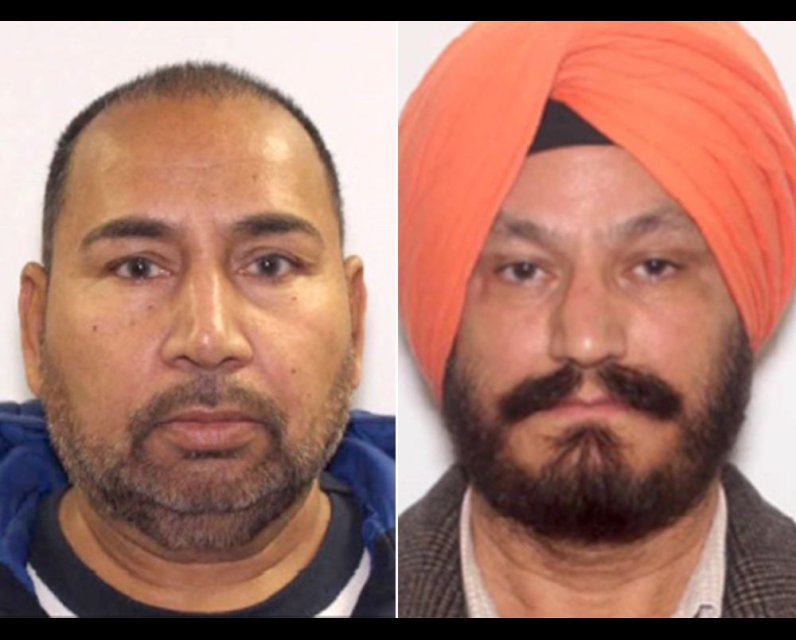Stay informed
Truck drivers were key pieces of giant jigsaw in Ryan Wedding's alleged narco empire

It was 3:26 in the morning when a long-haul tractor trailer loaded with steel bars pulled up on the U.S. side of the Blue Water Bridge at the southern end of Lake Huron, connecting Ontario and Michigan.
The driver, Iqbal Singh Virk, an owner-operator of the truck based in Brampton, Ont., lowered his window to speak with U.S. Customs officers monitoring overnight traffic on Aug. 28, 2024. In the passenger seat was Ranjit Singh Rowal, who shared the driving.
Virk answered their questions: No, they didn’t they have guns, drugs, or cash over $5,000 with them; no one had given them anything to bring across; they were both Indian citizens with permanent resident status in Canada.
Experienced drivers, it must have seemed routine until Virk was told to pull his truck over for inspection. Less than 10 minutes after they had rolled up at the border, a Rapiscan X-ray system was crawling over their truck.
It’s a system that penetrates steel and it spotted what the drivers hoped it wouldn’t.
At the rear of their trailer was an anomaly — a long, thin compartment above the trailer’s Ontario licence plate that wouldn’t normally be there. Officers were soon pulling bricks wrapped together in cellophane out from that hole, stacking them on the loading bay floor. They counted 115 bricks weighing slightly more than 124 kilos. An officer estimated that if it is high-grade cocaine it would be worth close to US$4 million.
That evidence left little room for the truckers to maneuver.
As they waited in jail over the next few months, the case ballooned into something that would soon burst into clanging news coverage.
Some 3,700 kilometres along the highways Virk and Rowal had just driven, in Los Angeles, U.S. authorities had been investigating a huge international criminal enterprise. That violent and prolific cartel, authorities claimed, was headed by Ryan Wedding, a former Olympic snowboarder for Team Canada. Wedding, born in Thunder Bay, Ont., was named the mastermind behind a deluge of cocaine flowing from Colombia to California and then to Canada, from a safe space in Mexico.
Two months after the border arrests of Virk and Rowal, an indictment was unsealed with Wedding’s name at the top — alongside his nicknames of “Giant” and “El Jefe,” Spanish for the boss — followed by 15 others. Ten of them were Canadian citizens or residents. The allegations called them organizers, traffickers, hitmen, transportation gurus and wheelmen. Last week the FBI called Wedding a modern-day Pablo Escobar and El Chapo Guzman, two of history’s most notorious drug lords.
The last two names on that indictment are Virk and Rowal.
While their role among the alarming accounts of murders and mega-loads seems small, the details of their cases, which have now been proven in court through guilty pleas — the first for any of the Canadians caught in the probe — shows them as an important piece of a jigsaw that knitted a transportation network in Canada to a narco cartel abroad, and reveals how the organizations generated huge amounts of money.
Evidence presented in court while Virk and Rowal tried to quickly settle their cases says that international narcos had negotiated a haulage deal with a network of Indo-Canadian trucking firms and drivers based in Brampton, Ont., northwest of Toronto.
A dispatcher sent by the narcos would meet various drivers of Canada-bound commercial trucks at meeting spots in and around Los Angeles and hand over bricks of pressed cocaine. The drivers would hide the bricks in their trucks and then drive northeast into Canada, where the drugs were distributed by others.
The trucks were also hauling legitimate cargo to camouflage the trips and they got lost in the constant back-and-forth at some of the world’s busiest commercial border points. Members of the cooperating networks used serial numbers from U.S. one-dollar bills, swapped over encrypted communications, as passcodes to identify each other at their rendezvous.
Sometimes it went more smoothly than others.
In early April 2024, Virk — now 65 years old — agreed to collect a load of cocaine in California from the narcos and haul it back when next bringing in a load of regular cargo.
Virk and Rowal, who co-owned a tractor-trailer, drove into the United States on April 28, 2024, and headed for Los Angeles. They pulled the truck into a rest stop on May 3, 2024, and waited for the drugs to be delivered. A dispatcher for the narco said two large deliveries were coming. That was a problem because their compartment could only fit about 250 kilos.
It became an argument at the highest level. Authorities allege that Wedding, through encrypted messaging, asked for a discount on the transportation cost — $150,000 instead of the $220,000 previously agreed. The transport boss in Canada refused the lower price. Wedding allegedly refused to pay full freight for a load 30 per cent smaller and the deal was scrapped after a standoff.
Nobody involved in the deals knew it at the time, but it turns out that the bosses weren’t arranging the deal directly with each other. The FBI had infiltrated the operation and inserted a confidential source as a go-between.
That infiltration helps explain why, three months later, Virk and Rowal were stopped at the border bridge when next trying to cross back into Canada. Their load that day was later found to be split between cocaine and heroin, court records say.
When both men were arrested, through a Punjabi interpreter, Virk told officers he had been a truck driver for seven years and routinely crossed the border, sometimes weekly, but didn’t admit to the drugs. Rowal wouldn’t say anything at all.
They were both arrested on drug charges and detained. They were transferred to California to face courts on the wider allegations.
On Aug. 5, Rowal signed a plea agreement with prosecutors. He agreed to plead guilty to two charges: conspiracy to distribute cocaine and possession with intent to distribute cocaine. Virk signed a similar agreement 10 days later.
They agreed they conspired with two or more people to distribute cocaine, knew they were carrying drugs and knew it was destined for further distribution. Their replacement charge informations for their plea were stripped of co-conspirator names, notably Wedding’s.
Their plea deals said the maximum penalty they faced was life imprisonment but their guilty pleas would lower that. They agreed to forfeit all property involved in the crime, including the truck.
Both men are citizens of India and travelled on an Indian passport who immigrated to Canada where they attained permanent resident status.
After his guilty plea but before his sentencing, Rowal’s lawyers asked the judge to order the return of his passport, Ontario health card, driver’s licence, cell phone and rings he was wearing. His lawyer said he needed the items to prepare for his departure from the United States. His lawyers had hopes that would happen soon, as they argued for Rowal to be sentenced to time already served and released.
One of his lawyers, Haley Huntley urged that his sentencing move quickly, saying Rowal placed “profound emotional and psychological importance” on wrapping it up and was counting “how many squares on the calendar” there were before sentencing.
“He has been planning for this day as one of the most important in his life, and he is eager for his sentencing to go forward as planned,” Huntley told the judge.
By that point, Rowal had been in jail for 449 days.
The night before sentencing, prosecutors filed a document in court saying they had talked to the RCMP about Rowal’s status in Canada and were told that as a non-citizen permanent resident in Canada he would be considered inadmissible to the country after his conviction for serious criminality and sent for an admissibility hearing. A removal order against him was the likely outcome, they said the RCMP told them, leading to removal to India.
His lawyer lambasted prosecutors for it.
“The government then prepared and filed a public document, giving this useless information to the whole world. The government lawyers are supposed to pursue justice; they should not aim to inflict as much pain as possible, and unnecessary pain, on disenfranchised and indigent defendants.”
In court, Judge Sherilyn Peace Garnett accepted Rowal’s guilty plea and sentenced him to 37 months in prison. She recommended the U.S. Bureau of Prisons place him in a facility close to Canada, an hour’s drive from the border.
Virk, who also goes by the name Mark, pleaded guilty as well, in September, but his sentencing hearing has been delayed. It is now scheduled for March.
Lawyers for the two could not be reached for comment prior to publication deadline.
• Email: ahumphreys@postmedia.com | X: AD_Humphreys
Our website is the place for the latest breaking news, exclusive scoops, longreads and provocative commentary. Please bookmark nationalpost.com and sign up for our newsletters here.



Comments
Be the first to comment